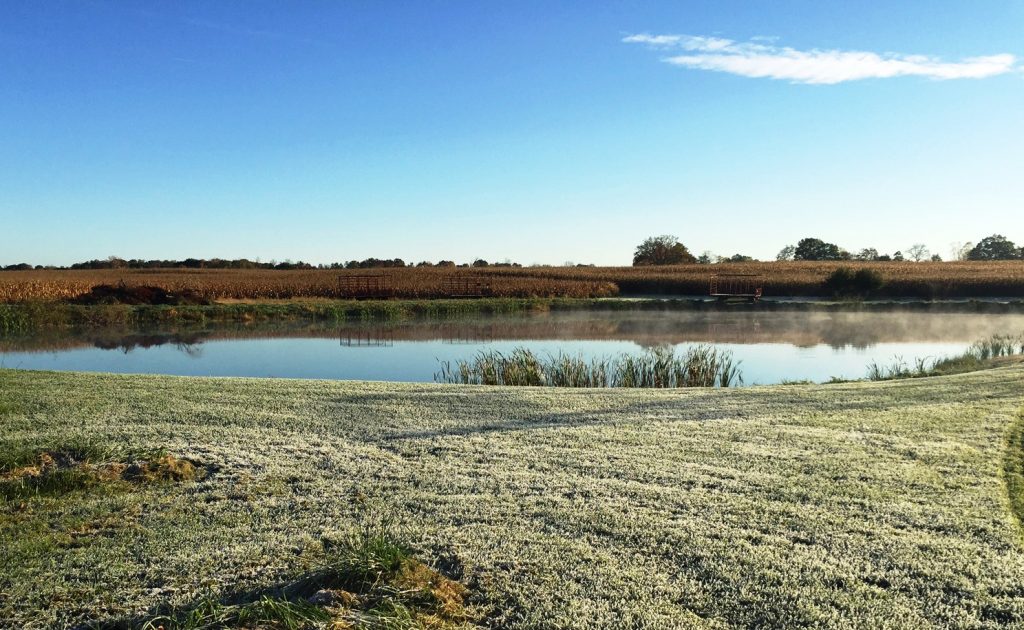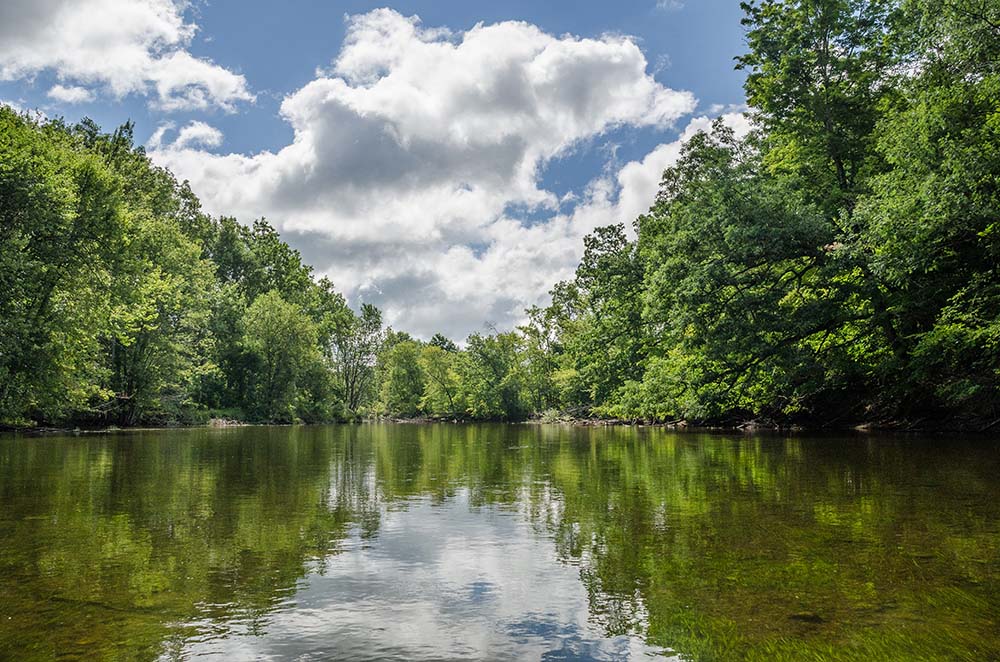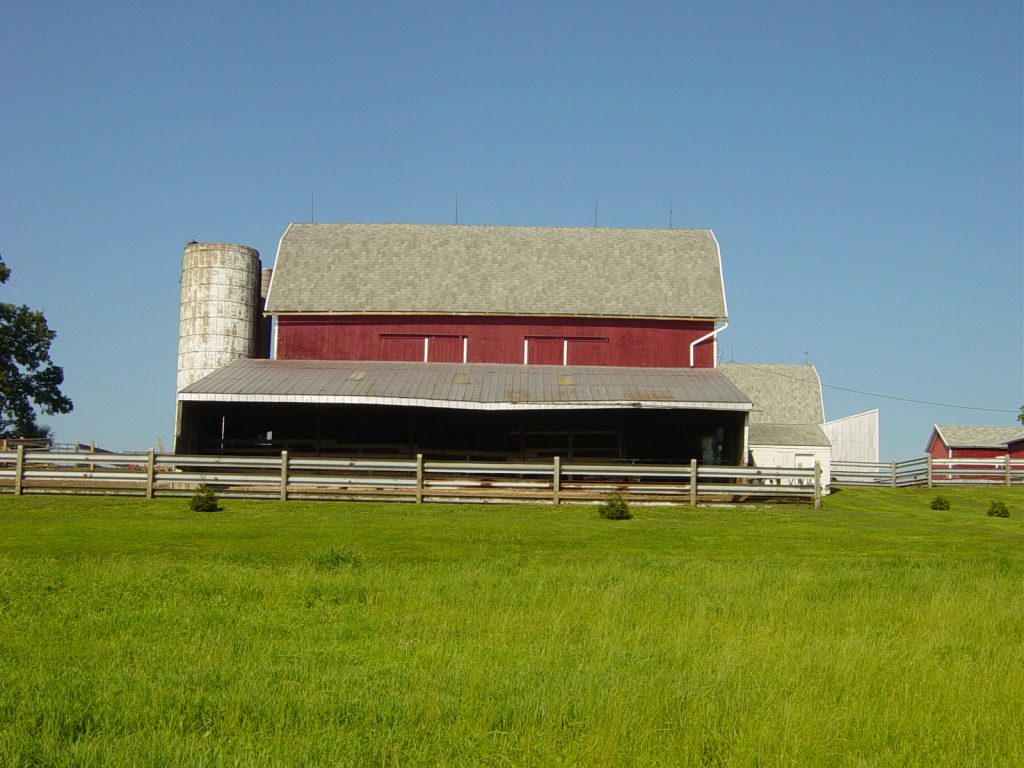This article originally appeared in the Spring 2017 issue of The Understory, Legacy’s newsletter, which you can download as a PDF.
By Meghan Prindle, Community and Landowner Outreach Coordinator

“The Huron River Initiative” will improve water quality in the Huron River through strategies including land protection, so that more properties can join this one in being permanently protected. Photo courtesy of Ruth Thornton, Ann Arbor Greenbelt Program.
A lot has changed since the Natural Resource Conservation Service (NRCS) was created in the depths of the Dust Bowl of the 1930s—but the agency’s commitment to innovation remains strong. NRCS strategies include local conservation districts, cost-share programs, watershed-wide planning initiatives, and rental payments for converting cropland to grassland and forest. NRCS has continued to push the envelope as each generation’s conservation challenges arise.
Today, that innovative spirit lives on in yet another way (one that involves Legacy): the Regional Conservation Partnership Program (RCPP). Facing budget cuts prior to the renewal of the 2014 Farm Bill, lawmakers—including Michigan’s own Senator Debbie Stabenow—got creative. They addressed cuts by creating a program that puts local partners (like us!) in the driver’s seat, rewards teamwork, and streamlines funding by targeting watershed-specific natural resource concerns.
What is RCPP?

The Huron River is the cleanest urban river in Michigan and provides clean drinking water for half a million people, so there’s a lot at stake in keeping it healthy. Photo by John Lloyd.
RCPP is a competitive program that earmarks additional funding to be spent by NRCS programs in a specific project area. Legacy is proud to be the lead partner on our local RCPP project, The Huron River Initiative (one of eight projects in Michigan). The Huron River watershed provides clean drinking water and abundant outdoor recreation opportunities for its half-million residents. As the cleanest urban river in Michigan, the Huron is a showcase for what’s at stake in keeping it healthy.
Our partnership secured $1.8 million in federal NRCS direct-to-landowner funding over the next five years in our project area, which extends from just north of Ann Arbor upstream to the Huron’s headwaters in White Lake and Highland.
This is great news for our region. The very competitive RCPP process provides partners greater flexibility and control when navigating traditional NRCS programs. The result? Now landowners can more easily tap into funds for projects on their property that improve water quality and protect the Huron River.
How it works

“The Huron River Initiative” will protect 400 acres of farmland in an area at high risk of farmland loss to development, in part by funding the purchase of conservation easements that enable farmers to permanently protect their land. This farm is protected in partnership with Washtenaw County Parks and Recreation Commission. Photo by Allene Smith.
Our RCPP partnership (see Partners, below) will help local landowners directly access this special federal funding for purchase of conservation easements, wetland restoration, and implementation of farmland best-management practices, such as buffer zones and cover crops. These approaches will protect 400 acres of farmland in an area at high risk of loss to development, and will reduce runoff-related pollution to the Huron River (and ultimately to Lake Erie).
A critical part of this project is leveraging partners’ strengths, including experience with farmland protection, a taxpayer-supported millage, a dedicated volunteer base, and outreach capacity. This specially designated $1.8 million is quite an investment in the health of our region’s land and waters. I like to think that NRCS’s continued innovation is comparable to Legacy’s own evolution, with RCPP providing yet another boost to securing this generation’s contribution to the Emerald Arc.
If you own farmland in northern Washtenaw County and would like to learn more, please contact Meghan Prindle at 734-302-5263 or [email protected]. Special thanks to the Community Foundation of Southeast Michigan, the James A. and Faith Knight Foundation, and the Carls Foundation for helping us lay the groundwork to earn this RCPP award.
Partners in Protecting the Huron River Watershed
The Huron River Initiative leverages the strengths and expertise of seven partners:
- Legacy Land Conservancy (lead partner)
- Ann Arbor Greenbelt (City of Ann Arbor Openspace and Parkland Preservation Program)
- Washtenaw County Parks and Recreation Commission
- Six Rivers Land Conservancy
- Huron River Watershed Council
- Ducks Unlimited, LLC
- Natural Resource Conservation Service

 RSS Feed
RSS Feed